- Home
- Tim LaHaye
Nicolae: The Rise of Antichrist Page 3
Nicolae: The Rise of Antichrist Read online
Page 3
Buck stood. “I suppose I am asking too much. Another dealer will be willing to go the extra mile to sell me a vehicle, I’m sure, especially when no one knows what tomorrow may bring.”
“Sit back down, Mr. Williams. I won’t have any trouble getting my district manager to sign off on throwing in that little errand for you. As you can see, you’re going to be able to drive your fully loaded Range Rover out of here within an hour for under six figures.”
“Make it half an hour,” Buck said, “and we’ve got a deal.”
The sales manager rose and thrust out his hand. “Deal.”
CHAPTER 2
The Learjet was a six-seater. Carpathia and Fortunato, deep in conversation, ignored Rayford and Amanda as the couple passed. The Steeles ducked into the last two seats and held hands. Rayford knew global terror was entirely new to Amanda. It was new to him. On this scale, it was new to everyone. She gripped his hands so tight his fingers turned white. She was shuddering.
Carpathia turned in his seat to face them. He had that fighting-a-grin look Rayford found so maddening in light of the situation. “I know you are not certified on these little speedsters,” Carpathia said, “but you might learn something in the copilot’s chair.”
Rayford was much more worried about the plane he would be expected to fly out of Dallas, something he had never seen or even heard of. He looked at Amanda, hoping she would plead with him to stay with her, but she quickly let go of his hand and nodded. Rayford climbed toward the cockpit, which was separated from the other seats by a thin panel. He strapped himself in and looked apologetically at the pilot, who offered his hand and said, “Chico Hernandez, Captain Steele. Don’t worry, I’ve already done the preflight check, and I don’t really need any help.”
“I wouldn’t be of any help anyway,” Rayford said. “I haven’t flown anything smaller than a 707 for years.”
“Compared to what you usually fly,” Hernandez said, “this will seem like a motorbike.”
And that’s exactly what it seemed to Rayford. The Learjet screamed and whined as Hernandez carefully lined it up on the runway. They seemed to hit top ground speed in seconds and quickly lifted off, banking hard to the right and setting a course for Dallas. “What tower do you connect with?” Rayford asked.
“The tower’s empty at Glenview,” Hernandez said.
“I noticed.”
“I’ll let a few towers know I’m coming along the way. The weather people tell us we’re clear all the way, and Global Community intelligence spots no enemy aircraft between here and touchdown.”
Enemy aircraft, Rayford thought. There’s an interesting way to refer to American militia forces. He recalled not liking the militias, not understanding them, assuming them criminals. But that had been when the American government was also their enemy. Now they were allies of lame duck United States President Gerald Fitzhugh, and their enemy was Rayford’s enemy—his boss, of all things, but his enemy nonetheless. Rayford had no idea where Hernandez came from, what his background was, whether he was sympathetic and loyal to Carpathia or had been pressed into reluctant service as Rayford himself had. Rayford slipped on earphones and found the proper dials so he could communicate to the pilot without allowing for anyone else to hear. “This is your pretend first officer,” he said softly. “Do you read me?”
“Loud and clear, ‘Copilot’,” Hernandez said. And as if reading Rayford’s mind, Hernandez added, “This channel is secure.”
Rayford took that to mean that no one else, inside or outside the plane, could hear their conversation. That made sense. But why had Hernandez said that? Had he realized that Rayford wanted to talk? And how comfortable would Rayford be talking to a stranger? Just because they were fellow pilots didn’t mean he could bare his soul to this man. “I’m curious about Global Community One,” Rayford said.
“You haven’t heard?” Hernandez asked.
“Negative.”
Hernandez shot a glance behind him at Carpathia and Fortunato. Rayford chose not to turn, so as not to arouse any suspicion. Apparently, Hernandez had found Carpathia and Fortunato in earnest discussions again, because he told what he knew about Rayford’s former plane.
“I suppose the potentate would have told you himself if he had had the chance,” Hernandez said. “There’s not good news out of New York.”
“I heard that,” Rayford said. “But I hadn’t heard how widespread the damage was at the major airports.”
“Just about total destruction, I understand. We know for sure that the hangar where she was located was virtually vaporized.”
“And the pilot?”
“Earl Halliday? He was long gone by the time of the attack.”
“He’s safe then?” Rayford said. “That’s a relief! Do you know him?”
“Not personally,” Hernandez said. “But I’ve heard a lot about him in the past few weeks.”
“From Carpathia?” Rayford said.
“No. From the North American delegation to the Global Community.”
Rayford was lost, but he didn’t want to admit it. Why would the North American delegation be talking about Earl Halliday? Carpathia had asked Rayford to find someone to fly the Global Community One 777 to New York while Rayford and Amanda were taking a brief vacation in Chicago. Carpathia was to spend a few days confusing the press and the insurrectionists (President Fitzhugh and several American militia groups) by ignoring his published itinerary and being shuttled from place to place. When the militia attacked and the Global Community retaliated, Rayford had assumed that at least the timing was a surprise. He also assumed that his selection of his old friend and boss at Pan-Continental Airlines as the one to ferry the empty 777 to New York was of little consequence to Nicolae Carpathia. But apparently Carpathia and the North American delegation had known exactly whom he would choose. What was the point of that? And how did Halliday know to get out of New York in time to avoid being killed?
“Where is Halliday now?” Rayford asked.
“You’ll see him in Dallas.”
Rayford squinted, trying to make it all compute. “I will?”
“Who did you think was going to take you through the paces of the new aircraft?”
When Carpathia had told Rayford he might learn a few things by sitting in the copilot’s chair, Rayford had had no idea it would entail more than a few interesting tidbits about this quick, small jet. “Let me get this straight,” he said. “Earl Halliday knew about the new plane and is conversant enough to teach me to drive it?”
Hernandez smiled as he scanned the horizon and maneuvered the Learjet. “Earl Halliday practically built the Condor 216 himself. He helped design it. He made sure anyone who was certified on a seven-seven-seven would be able to fly it, even though it’s much bigger and a whole sight more sophisticated than Global Community One.”
Rayford felt an ironic emotion rise within him. He hated Carpathia and knew precisely who he was. But as strange as his wife’s taking offense at Carpathia’s insistence on getting her name wrong, Rayford suddenly felt left out of the loop. “I wonder why I would not have been informed of a new plane, especially if I am supposed to be its pilot,” he said.
“I can’t say for sure,” Hernandez said, “but you know the potentate tends to be very wary, very careful, and very calculating.”
Don’t I know it? Rayford thought. Conniving and scheming is more like it. “So he apparently doesn’t trust me.”
“I’m not sure he trusts anyone,” Hernandez said. “If I were in his shoes, I wouldn’t either. Would you?”
“Would I what?”
“Would you trust anyone if you were Carpathia?” Hernandez said.
Rayford did not respond.
“Do you feel like you just spent the devil’s money?” Chloe asked Buck as he carefully pulled the beautiful, new, earth-toned Range Rover out of the dealership and into traffic.
“I know I did,” Buck said. “And the Antichrist has never invested a better dollar for the cause of God.”
“You consider spending almost a hundred thousand dollars on a toy like this an investment in our cause?”
“Chloe,” Buck said carefully, “look at this rig. It has everything. It will go anywhere. It’s indestructible. It comes with a satellite phone. It comes with a citizen’s band radio. It comes with a fire extinguisher, a survival kit, flares, you name it. It has four-wheel drive, all-wheel drive, independent suspension, a CD player that plays those new two-inch jobs, electrical outlets, you name it.”
“But Buck, you slapped down your Global Community Weekly credit card as if it were your own. What kind of a limit do you have on that thing?”
“Most of the cards Carpathia issues like this have a quarter-of-a-million-dollar limit,” Buck said. “But those of us at senior levels have a special code built into ours. They’re unlimited.”
“Literally unlimited?”
“Didn’t you see the eyes of that sales manager when he phoned for verification?”
“All I saw,” Chloe said, “was a smile and a done deal.”
“There you go.”
“But doesn’t somebody have to approve purchases like that?”
“I report directly to Carpathia. He might want to know why I bought a Range Rover. But it should certainly be easy enough to explain, what with the loss of our apartment, our vehicles, and the need to be able to get wherever we have to go.”
Once again, Buck soon grew impatient with the traffic. This time, when he left the road and made his way through ditches, gullies, parkways, alleys, and yards, the ride was sure and, if not smooth, purposeful. That vehicle was made for this kind of driving.
“Look what else this baby has,” Buck said. “You can switch between automatic or manual transmission.”
Chloe leaned down to look at the floorboard. “What do you do with the clutch when you’re in automatic?”
“You ignore it,” Buck said. “You ever drive a stick?”
“A friend in college had a little foreign sports car with a stick shift,” she said. “I loved it.”
“You wanna drive?”
“Not on your life. At least not now. Let’s just get to the church.”
“Anything else I should know about what we’re going to encounter in Dallas?” Rayford asked Hernandez.
“You’re gonna be ferrying a lot of VIPs back to Iraq,” Hernandez said. “But that’s nothing new for you, is it?”
“Nope. I’m afraid it’s lost its luster by now.”
“Well, for what it’s worth, I envy you.”
Rayford was stunned to silence. Here he was, what Bruce Barnes referred to as a tribulation saint, a believer in Christ during the most horrifying period in human history, serving Antichrist himself against his own will and certainly at the peril of his wife, his daughter, her husband, and himself. And yet he was envied.
“Don’t envy me, Captain Hernandez. Whatever you do, don’t envy me.”
As Buck neared the church, he noticed yards full of people. They stared at the sky and listened to radios and TVs that blared from inside their houses. Buck was surprised to see one lone car in the parking lot at New Hope. It belonged to Loretta, Bruce’s assistant.
“I don’t look forward to this,” Chloe said.
“I hear you,” Buck said.
They found the woman, now nearly seventy, sitting stiffly in the outer office staring at the television. Two balled-up tissues rested in her lap, and she riffled a third in her bony fingers. Her reading glasses rode low on her nose, and she peered over the top of them at the television. She did not seem to look Buck and Chloe’s way as they entered, but it soon became clear she knew they were there. From the inner office, Buck heard a computer printer producing page after page after page.
Loretta had been a southern belle in her day. Now she sat red-eyed and sniffling, fingers working that tissue as if creating some piece of art. Buck glanced up to see a helicopter view of the bombed-out Northwest Community Hospital. “People been callin’,” Loretta said. “I don’t know what to tell ’em. He couldn’t survive that, could he? Pastor Bruce, I mean. He couldn’t still be alive now, could he? Did y’all see him?”
“We didn’t see him,” Chloe said carefully, kneeling next to the old woman. “But my dad did.”
Loretta turned quickly to stare at her. “Mr. Steele saw him? And is he all right?”
Chloe shook her head. “I’m sorry, ma’am, he’s not. Bruce is gone.”
Loretta lowered her chin to her chest. Tears gathered and pooled in her half-glasses. She spoke hoarsely. “Would y’all mind turnin’ that off then, please. I was just praying I’d catch a glimpse of Pastor Bruce. But if he’s under one of those sheets, I don’t care to see that.”
Buck turned off the TV as Chloe embraced the old woman. Loretta broke down and sobbed. “That young man was like family to me, you know.”
“We know,” Chloe said, crying herself now. “He was family to us, too.”
Loretta pulled back to look at Chloe. “But he was my only family. You know my story, don’t you?”
“Yes, ma’am—”
“You know I lost everybody.”
“Yes, ma’am.”
“I mean, everybody. I lost every living relative I had. More than a hundred. I came from one of the most devout, spiritual heritages a woman could come from. I was considered a pillar of this church. I was active in everythin’, a church woman. I just never really knew the Lord.”
Chloe held her close and cried with her.
“That young man taught me everythin’,” Loretta continued. “I learned more from him in two years than I learned in more than sixty years in Sunday school and church before that. I’m not blamin’ anybody but myself. I was deaf and blind spiritually. My daddy had gone on before, but I lost Mama, all six of my brothers and sisters, all of their kids, their kids’ husbands and wives. I lost my own children and grandchildren. Everybody. If somebody had made a list of who in this church would be most likely to go to heaven when they died, I would have been at the top of the list, right up there with the pastor.”
This was as painful for Buck as it seemed for Chloe and Loretta. He would grieve in his own way and his own time, but for now he didn’t want to dwell on the tragedy. “What’re you working on in the office, ma’am?” he said.
Loretta cleared her throat. “Bruce’s stuff, of course,” she managed.
“What is it?”
“Well, you know when he got back from that big teaching trip of his in Indonesia, he had some sort of a virus or something. One of the men rushed him to the hospital so fast that he left his laptop computer here. You know he took that thing with him everywhere he went.”
“I know he did,” Chloe said.
“Well, as soon as he was settled into that hospital, he called me. He asked me to bring that laptop to him if I could. I would’ve done anythin’ for Bruce, of course. I was on my way out the door with it when the phone rang again. Bruce told me they were taking him out of the emergency room and straight to intensive care, so he wouldn’t be able to have any visitors for a while. I think he had a premonition.”
“A premonition?” Buck said.
“I think he knew he might die,” she said. “He told me to keep in touch with the hospital for when he could have visitors. He was fond of me, but I know he wanted that laptop more than he wanted to see me.”
“I’m not so sure about that,” Chloe said. “He loved you like a mother.”
“I know that’s true,” Loretta said. “He told me that more than once. Anyway, he asked if I would print out everything he had on his hard drive off his computer, you know, everything except what he called program files and all that.”
“What?” Chloe asked. “His own Bible studies and sermon preparation, stuff like that?”
“I guess,” Loretta said. “He told me to make sure I had plenty of paper. I thought he meant like just a ream or something.”
“It’s taken more than that?” Buck said.
“Oh, yes
sir, much more than that. I stood there feeding that machine every two hundred pages or so until I’d finished up two reams. I’m scared to death of those computers, but Bruce talked me through how to print out everything that had a file name that began with his initials. He told me if I just typed in ‘Print BB*.*’ that it should spit out everything he wanted. I sure hope I did the right thing. It’s given him more than he could ever want. I suppose I should just shut it down now.”
“You’ve got a third ream going in there?” Chloe said.
“No. I got some help from Donny.”
“The phone guy?” Buck said.
“Oh, Donny Moore is a whole lot more than just a phone guy,” Loretta said. “There’s hardly anything electronic he can’t fix or make better. He showed me how I can use those old boxes of continuous-feed computer paper in our laser printer. He just hauled a box out and fed it in one end and it comes out the other so I don’t have to keep feeding it.”
“I didn’t know you could do that,” Buck said.
“Neither did I,” Loretta said. “There’s a lot of stuff Donny knows that I don’t. He said our printer was pretty new and fancy and should be kicking out close to a page a second.”
“And you’ve been doing this how long?” Chloe said.
“Just about ever since I talked to Bruce from the hospital this morning. There was probably a five- or ten-minute break after those first two reams and before Donny helped me get that big box of paper under there.”
Buck slipped into the inner office and stood watching in amazement as the high-tech printer drew page after page from the paper box through its innards and out the other side into a stack that was threatening to topple. He straightened the stack and stared at the box. The first two reams of printed material, all single-spaced, lay neatly on Bruce’s desk. The old paper box, the likes of which Buck hadn’t seen in years, noted that it contained five thousand sheets. He guessed that it had already used 80 percent of its total. Surely, there must be some mistake. Could Bruce have produced more than five thousand pages of notes? Perhaps there was a glitch and Loretta had mistakenly printed everything, including program files, Bibles and concordances, dictionaries, and the like.

 Glorious Appearing: The End of Days
Glorious Appearing: The End of Days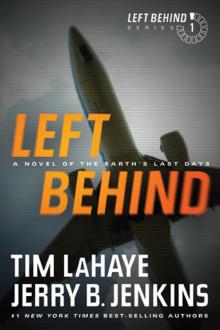 Left Behind: A Novel of the Earth's Last Days
Left Behind: A Novel of the Earth's Last Days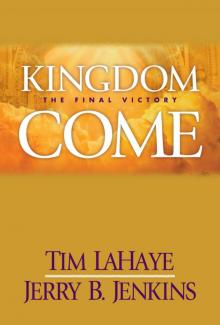 Kingdom Come: The Final Victory
Kingdom Come: The Final Victory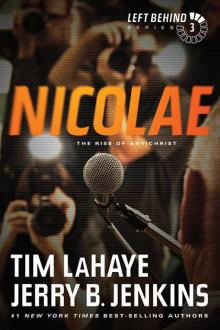 Nicolae: The Rise of Antichrist
Nicolae: The Rise of Antichrist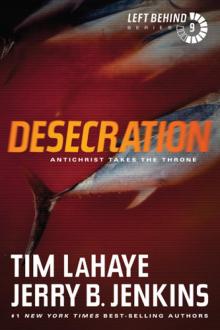 Desecration: Antichrist Takes the Throne
Desecration: Antichrist Takes the Throne Mark's Story: The Gospel According to Peter
Mark's Story: The Gospel According to Peter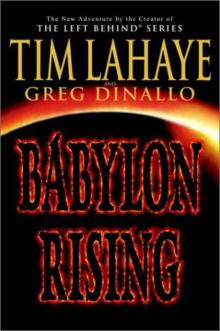 Babylon Rising
Babylon Rising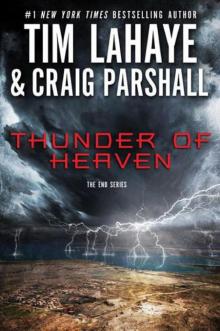 Thunder of Heaven: A Joshua Jordan Novel
Thunder of Heaven: A Joshua Jordan Novel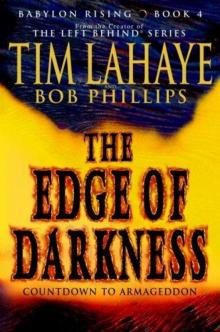 The Edge of Darkness
The Edge of Darkness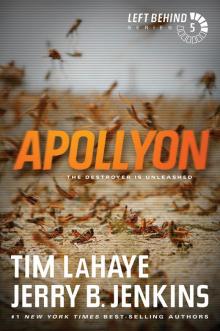 Apollyon: The Destroyer Is Unleashed
Apollyon: The Destroyer Is Unleashed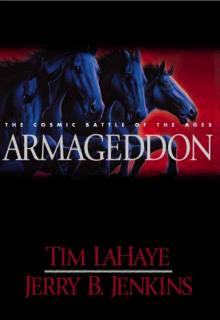 Armageddon: The Cosmic Battle of the Ages
Armageddon: The Cosmic Battle of the Ages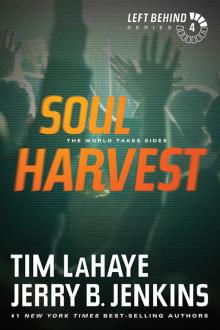 Soul Harvest: The World Takes Sides
Soul Harvest: The World Takes Sides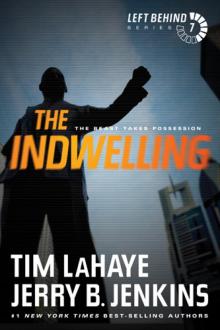 The Indwelling: The Beast Takes Possession
The Indwelling: The Beast Takes Possession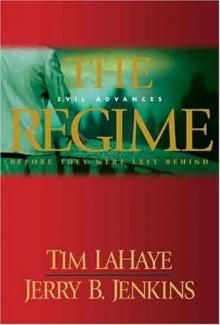 The Regime: Evil Advances
The Regime: Evil Advances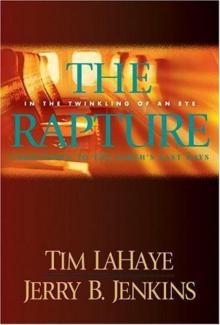 The Rapture: In the Twinkling of an Eye / Countdown to the Earth's Last Days
The Rapture: In the Twinkling of an Eye / Countdown to the Earth's Last Days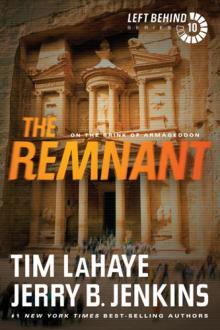 The Remnant: On the Brink of Armageddon
The Remnant: On the Brink of Armageddon John's Story: The Last Eyewitness
John's Story: The Last Eyewitness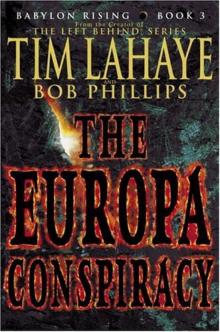 The Europa Conspiracy
The Europa Conspiracy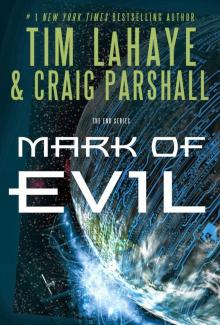 Mark of Evil
Mark of Evil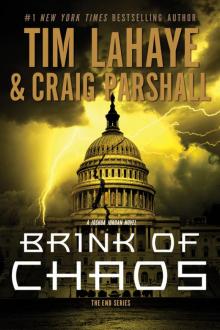 Brink of Chaos
Brink of Chaos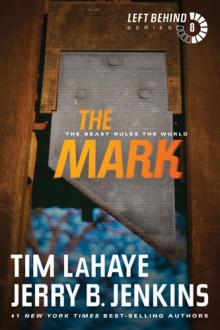 The Mark: The Beast Rules the World
The Mark: The Beast Rules the World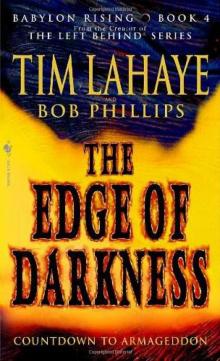 04 The Edge of Darkness
04 The Edge of Darkness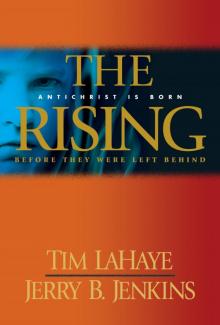 The Rising: Antichrist is Born / Before They Were Left Behind
The Rising: Antichrist is Born / Before They Were Left Behind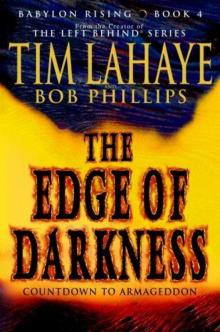 Babylon Rising: The Edge of Darkness
Babylon Rising: The Edge of Darkness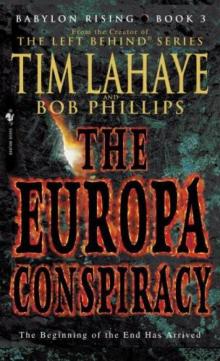 03 The Europa Conspiracy
03 The Europa Conspiracy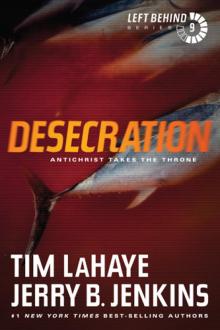 Desecration
Desecration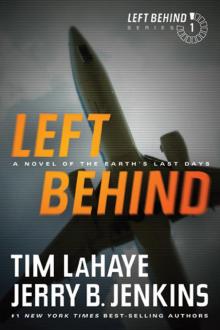 Left Behind
Left Behind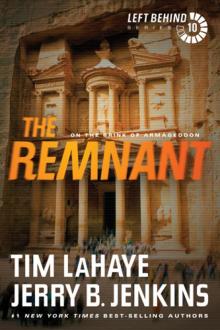 The Remnant
The Remnant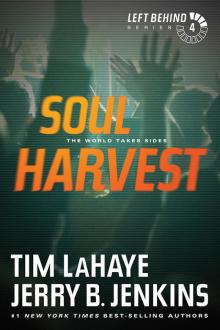 Soul Harvest
Soul Harvest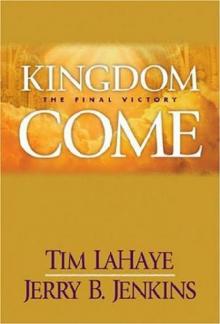 Left Behind Book 13: Kingdom Come The Final Victory
Left Behind Book 13: Kingdom Come The Final Victory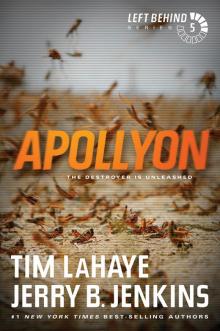 Apollyon
Apollyon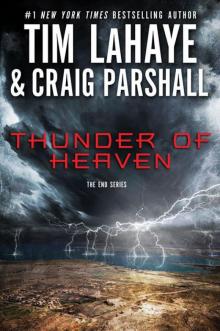 02 Thunder of Heaven: A Joshua Jordan Novel
02 Thunder of Heaven: A Joshua Jordan Novel Glorious Appearing
Glorious Appearing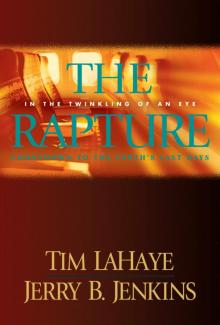 The Rapture: Evil Advances / Before They Were Left Behind
The Rapture: Evil Advances / Before They Were Left Behind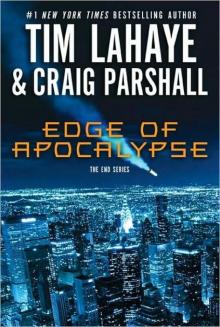 Edge of Apocalypse
Edge of Apocalypse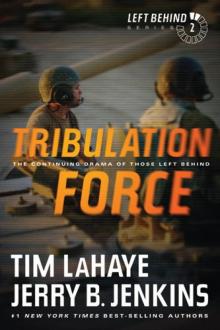 Tribulation Force
Tribulation Force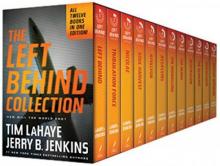 The Left Behind Collection: All 12 Books
The Left Behind Collection: All 12 Books Black Friday
Black Friday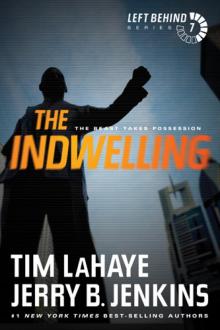 The Indwelling
The Indwelling The Left Behind Collection
The Left Behind Collection